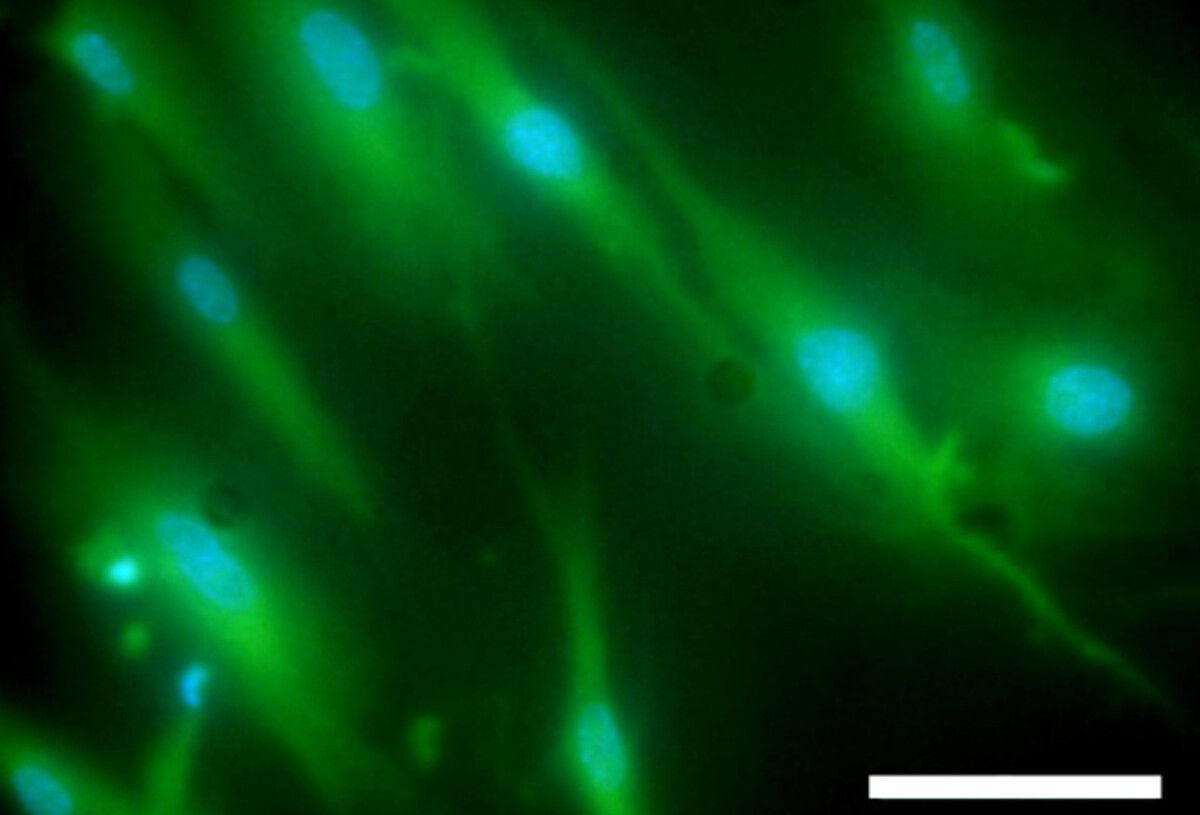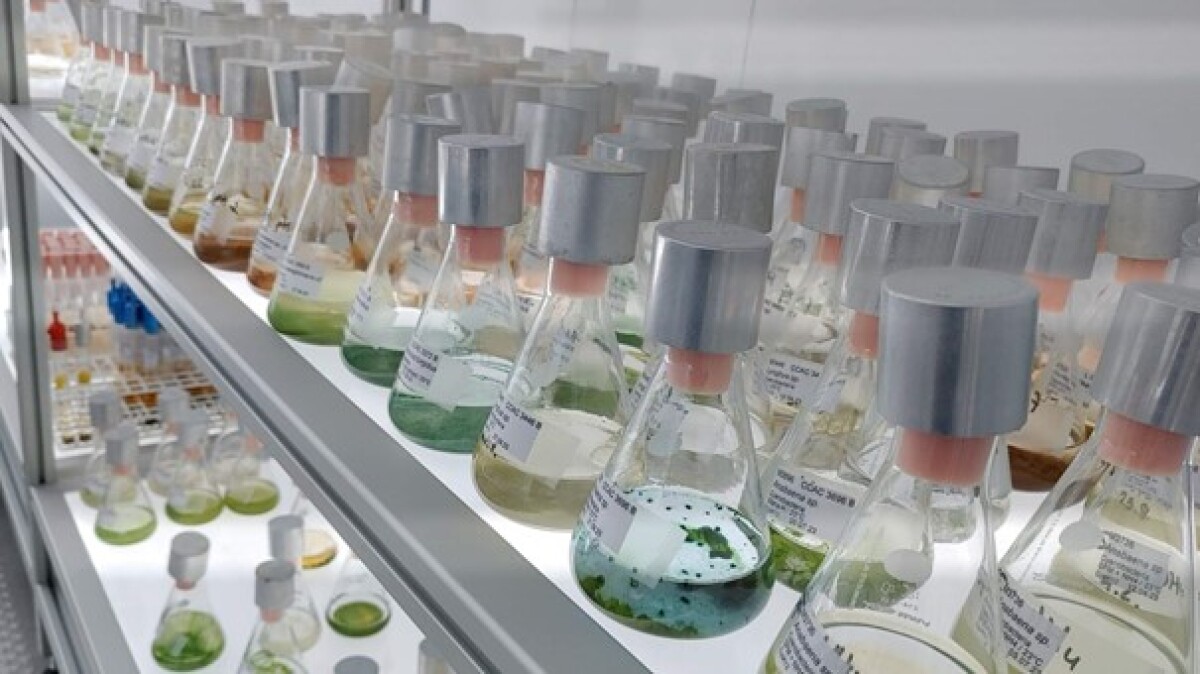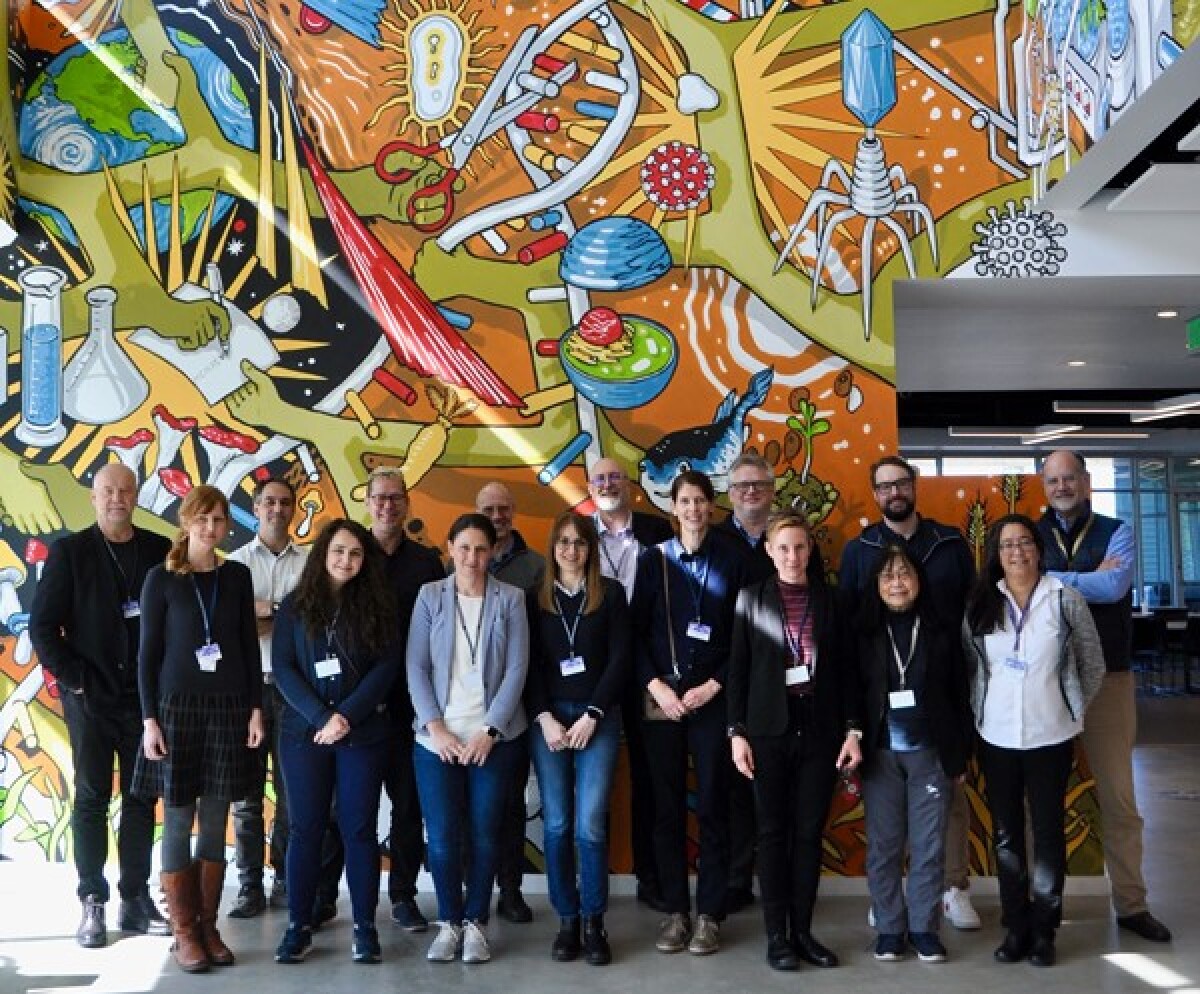News


Latest videoWatch progress on the construction site
[07.12.2025] Construction began in October 2025 with the building of the access road, earthworks and excavation of the pit. We regularly receive drone footage of the construction site. Here is the latest video, taken in December 2025.
Enjoy watching

New roadmap in Nature MicrobiologyFair Rules for Sharing Sequence Data
[29.09.2025] DNA and RNA datasets in public repositories are expanding at an unprecedented pace, creating a global atlas of microbial diversity. While open access continues to drive research forward, it also presents a dilemma: painstakingly collected data are often made available worldwide before the researchers who generated them can publish their own findings. In response, an international consortium of more than 230 scientists, led by Professor Alexander Probst of the University of Duisburg-Essen, has published a roadmap in Nature Microbiology to promote fairer handling of public sequence data. Read full UDE Press Release here. Read original article: Nat Microbiol (2025). https://doi.org/10.1038/s41564-025-02116-2

New project funded by the Brigitte and Dr. Konstanze Wegener FoundationTargeting Proteins with Nanobodies
[10.09.2025] Cancer cells often survive even strong therapies, partly due to a protein called survivin. A research team led by Shirley Knauer at the Center of Medical Biotechnology is now looking to disable this protection specifically. The aim is to bind survivin and break it down using novel nanobodies. This could make tumour cells more sensitive to treatment again. The project combines molecular biology, biochemistry and structural biology approaches. Read full UDE-article here.

Royal Society of ChemistryPCCP Emerging Investigator Lectureship Award
[08.09.2025] Kai Exner received the prestigous 2025’s PCCP Emerging Investigator Lectureship Award of the Royal Society of Chemistry. This award recognises and supports emerging scientists working in physical chemistry, chemical physics or biophysical chemistry, who are making outstanding contributions to their field, at an early stage of their careers. Congratulations to this success! Find more information here.

Research building ACTIVE SITESStart of construction in Thurmfeld
[11.07.2025] Work on the new ACTIVE SITES research building will start soon: the city of Essen and the municipal utilities will soon be constructing the necessary construction road. In September, Hochtief's excavators will start digging the foundations for the building, which will provide a physical hub for the University of Duisburg-Essen's internationally renowned water, catalysis, materials and protein research. 125 scientists are expected to work in the offices and laboratories of the new building on the Thurmfeld research and innovation campus in Essen from summer 2028. Read full UDE-article here (in German).
Picture: Exterior view of the new ACTIVE SITES research building and view of the atrium inside.

Publication in Nature CommunicationsNew Dynamics Discovered in Heterogeneous Catalysis
[07.07.2025] Oxygen evolution is considered one of the most energy-intensive steps in water electrolysis and is therefore a key factor for more efficient green hydrogen production. Modelling of the reaction mechanisms has so far been based on the assumption that the elementary steps take place sequentially and not in a concerted manner. A team led by Prof. Dr. Kai S. Exner from the University of Duisburg-Essen has now shown that this assumption is not always correct. The results, published in Nature Communications, open up new possibilities for improving solid catalysts for energy conversion and storage applications. Read full UDE Press Release here. Read original article: Nat. Commun. 16, 6137 (2025).
Image: Illustration of the Walden-like mechanism in which water (H2O) adsorbs on the catalytically active surface and oxygen (O2) detaches at the same time. Oxygen atoms are shown as large red spheres, hydrogen is symbolised by the smaller white ones. Iridium atoms are represented as large, light green spheres.

Delegation trip to Tokyo and TsukubaResearch cooperation in Japan is being strengthened by the University of Duisburg-Essen
[06.06.2025] A delegation from the University of Duisburg-Essen, including representatives from ACTIVE SITES, CENIDE, ZWU and the UA Ruhr Research Centre for One Health, established and renewed research collaborations. During the trip, the delegation attended a joint symposium with the University of Tsukuba, followed by a joint workshop at RIKEN and a visit to the National Institute of Advanced Industrial Science and Technology (AIST). This trip has opened up numerous opportunities for future cooperation in tackling interdisciplinary and complex global challenges in water, energy, materials, and health research, and the next steps in organising these projects are now being initiated.
UDE participants represented a variety of subject areas, including nano/material/energy science, catalysis, microbiology, water science, analytical chemistry and protein research: Corina Andronescu, Stephan Barcikowski, Kai Exner, Anzhela Galstyan, Shirley Knauer, Alexander Probst, Marika Schleberger and Oliver Schmitz. Special thanks for the invaluable local support go to the German House for Research and Innovation (DWIH) in Tokyo, and to Yusaku Nishijima from the University of Tsukuba's liaison office in Bochum.

Award for Corina AndronescuCorina Andronescu receives Lecturer Prize of the Chemical Industry Fund
[04.06.2025] Corina Andronescu has been awarded the Lecturer Prize of the Chemical Industry Fund as a particularly outstanding young scientist. The prize recognizes her pioneering work in electrochemical catalysis. The Lecturer Prize of the Chemical Industry Fund is awarded to young scientists who have made significant contributions to the field of chemistry. Corina Andronescu's research focuses on understanding complex electrochemically active materials, which are used in various important reactions for energy conversion and storage. Her work aims to close the gap in the development of new catalytic materials for technologies providing renewable energy sources, particularly hydrogen. Read the UDE Press Release here (in German).

Minister breaks groundStart for ACTIVE SITES research building
[07.04.2025] Today, 7 April, Ina Brandes, Minister of Culture and Science of the State of North Rhine-Westphalia, together with the Mayor of Essen, Thomas Kufen, broke ground for ACTIVE SITES on the Thurmfeld site in Essen. This marks the start of the University of Duisburg-Essen's new research building, which will bring together scientists from the natural sciences, life sciences and engineering. The German government and the state of North Rhine-Westphalia will each contribute half of the costs for construction and equipment, totalling around 70 million euros. Research operations are scheduled to start in the summer of 2028. Read full UDE press article here.
Photo (from left): Prof Dr Stephan Barcikowski, Mayor of Essen Thomas Kufen, NRW Science Minister Ina Brandes, Chancellor Ulf Richter, Rector Prof. Dr Barbara Albert.

New Research Training Group 3043 “AMTEC-PRO” Interdiscipliary research project on proton therapy
ACTIVE SITES members Anzhela Galstyan and Stephan Barcikowski are involved in a new research project focusing on proton therapy for the treatment of cancer. The German Research Foundation (DFG) has approved the establishment of the Research Training Group 3043 “AMTEC-PRO” at TU Dortmund University and the University of Duisburg-Essen. New approaches at the interface of physics, chemistry and medicine are being developed to reduce side effects and improve therapeutic outcomes. These include the use of nanoparticles as local sensitizers to increase reactive oxygen species in irradiated cells and the subsequent characterization of the induced molecular mechanisms. For more information read the UDE Press release.
The picture shows a confocal image of treated cells who were labelled with flourescent biomarkers to monitor cell viability (scale bar is 50 µm).

Fundamental Research for Energy TransitionGottschalk-Diederich-Baedeker-Prize for Kai Exner
[24.10.2024] Theoretical chemist Kai Exner has been awarded this year's Gottschalk-Diederich-Baedeker Prize. His basic research into electrocatalysts is making a significant contribution to advancing the energy transition. The prize, which is endowed with 5,000 euros was handed over by Essen's Lord Mayor Thomas Kufen. Read UDE Press Release here (in German)
Pictured (from left to right):
Laudator Prof. Dr.-Ing. Stephan Barcikowski, Mayor Thomas Kufen, award winner Prof. Dr. Kai S. Exner, Board of Trustees PD Dr. Kathrin Sutter, Rector Prof. Dr. Barbara Albert

Sequencing of the UDE algae collectionGenomic perspective on carbon and nitrogen cycling by algae and their symbiotic partners
[07.09.2024] With more than 7000 strains, the UDE's scientific algae collection is one of the largest in the world. The diversity of their metabolic properties is enormous. An interdisciplinary team of researchers from UDE and the Westphalian University of Applied Sciences has now successfully acquired research project funding from the renowned Joint Genome Institute of the Lawrence Berkeley National Laboratory (LBNL), Department of Energy in the USA, to fully sequence this scientific treasure. By decoding the algae DNA, the researchers hope to gain new insights into evolution, symbiosis with bacteria and viruses and their role in the ecosystem. Among other things, algae convert carbon dioxide into organic material and thus make an important contribution to the Earth's carbon cycle. With their ability to bind carbon dioxide, algae also help to mitigate climate change. In addition, the comparative analysis of their genomes will make it possible to decipher new biological mechanisms that are important for understanding molecular and cellular processes and for the development of bioproducts.
“The idea to sequence the UDE algae collection arose during a delegation trip to Berkeley in February this year when important points of contact between the institutes were identified,” says Alexander Probst, who is now also an Affiliate Scientist at the Joint Genome Institute of the Lawrence Berkeley National Laboratory. This project strengthens the close cooperation between Berkeley and Essen. A Memorandum of Understanding for further cooperation has already been signed for the new ACTIVE SITES research building at UDE and for the Center for Water and Environmental Research. The sequencing of the algae collection marks the first step in a long-term collaboration between the institutes and offers great potential for the internationally renowned water research at the UDE.
Read UDE Press Release here (in German):
Scientific Kick-Off
[17.04.2024] The University of Duisburg-Essen marked the start of the new ACTIVE SITES research center with a scientific kick-off event. Prof. Dr. Astrid Westendorf, Vice-Rector for Research at UDE, opened the program with a welcoming address. She emphasized that ACTIVE SITES is an important milestone for top international research at the University of Duisburg-Essen and also plays an important role in the water excellence cluster application REASONS.
Prof. Dr.-Ing. Stephan Barcikowski, spokesperson for ACTIVE SITES, began by summarizing the objectives of the research center and presenting the disciplines involved, which use their combined expertise to investigate the processes at the active centers of ultrafast and dynamic chemical reactions in their respective functional environment. In a series of presentations, the challenges and opportunities of the different research areas Preparation, Operando and Ambience were discussed. Read more
Two-day kick-off meetingCollaboration with Berkeley Lab
[Berkeley, 29.02.2024] In a two-day kick-off meeting at Lawrence Berkeley National Laboratory (Berkeley Lab) collaboration in the areas of genomics, structural biology, bioimaging and water research were intensified. The meeting was attended by key representatives from the DOE Joint Genome Institute (JGI), the Molecular Biophysics and Integrated Bioimaging (MBIB) Division and the Energy Storage & Distributed Resources Division of Berkeley Lab. Nine UDE scientists traveled to San Francisco Bay as representatives of ACTIVE SITES (ASC), the Center for Water and Environmental Research (ZWU) and the One Health Ruhr (OHR) research center. Read more about the LBNL-Visit.
Participants included Alexander Probst, Stephan Barcikowski, Lydia Didt, Anzhela Galstyan, Shirley Knauer, Beate Krok, Oliver J. Schmitz, and Kathrin Thedieck from UDE, alongside Nigel Mouncey, Hoi-Ying Holman and Tanja Woyke, Lauren Belisario, Greg Hura, Jan Kern, Nikos Kyrpides, Trent Northen, Robert Kostecki, Susan Tsutakawa, Junko Yano, and Petrus Zwart from Berkeley Lab.

International collaboration Visit of the Bioscience Division at NASA Ames Research Center
[23.02.2024] Our multidisciplinary UDE delegation with members of the research centers ACTIVE SITES, ZWU and One Health met with Parag Vaishampayan and his team of the Space Biosciences Division at NASA's Ames Research Center in California's Silicon Valley. Together we held a one-day workshop to explore potential research collaborations for the development of methods in the fields of nanoscience, biology and water research. The presentations and lab tour gave us a closer look at NASA's cutting-edge programs, like the Space Biology Program, the Human Research Program, and the Open Science Program OSDR. Numerous scientific topics and synergies for potential future project collaborations were identified.



